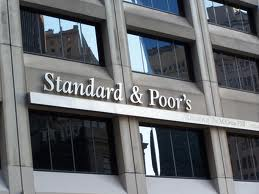
Standard & Poor’s has announced it is to be sued by the US government over the credit ratings agency’s assessment of mortgage bonds before the financial crisis.
The civil lawsuit would focus on S&P’s high ratings in 2007 for some mortgage-backed securities that later collapsed in value, said the agency.
S&P says the case is entirely without factual or legal merit.
The suit would be the first such case over alleged wrongdoing by a ratings agency tied to the financial crisis.
S&P said the justice department had informed them of the impending civil suit, although the federal agency declined to comment.
The move follows a breakdown in talks between the justice department and S&P, the Wall Street Journal reports.
Several states are expected to join the suit, US media report.
Shares in S&P’s owner, the US publishing and media group McGraw Hill, fell 14% on Wall Street on Monday following the announcement, while those in fellow ratings agency Moody’s fell 10% – indicating the market expects that they may be next in the justice department’s sights.
S&P and other agencies have faced criticism from investors, politicians and regulators for assigning their top AAA ratings to thousands of subprime and other mortgage securities that later collapsed in value.
Such agencies are paid by the issuers of bonds and other securities for ratings, raising concern about potential conflicts of interest.

Grades assigned by these firms can affect a company’s ability to raise or borrow money as well as how much investors will pay for their securities.
In the case of the subprime mortgage bubble, ratings agencies including S&P were hired to assess collateralized debt obligations (CDOs) – complex financial transactions that packaged together thousands of loans to individual homebuyers.
The ratings agencies’ job was to assess the likelihood that the home loans – and therefore the CDOs – would ultimately be repaid. Their ratings enabled the investment banks which put the CDOs together to then sell them to investors around the world.
In its January 2011 report, the US Financial Crisis Inquiry Commission called the agencies “essential cogs in the wheel of financial destruction” and “key enablers of the financial meltdown”.
S&P has previously disclosed a Securities and Exchange Commission (SEC) investigation into its rating of a specific $1.6 billion CDO known as Delphinus CDO 2007-1.
Delphinus was the basis of a $127 million settlement by Mizuho Financial Group over allegations that the US unit of the company obtained false credit ratings for the CDO using millions of dollars in dummy assets.
It is unclear if Delphinus is included in the expected civil suit.
S&P has also faced lawsuits from investors, and argues its ratings constitute opinions protected by the First Amendment to the US Constitution.
The firm says it “deeply regrets” how its CDO ratings failed to anticipate mortgage market conditions as the financial crisis hit, and that it has since spent $400m to help bolster the quality of its ratings.
“Every CDO that [the department] has cited to us also independently received the same rating from another rating agency,” S&P said in a statement on Monday.
“The Department of Justice would be wrong in contending that S&P ratings were motivated by commercial considerations and not issued in good faith.”